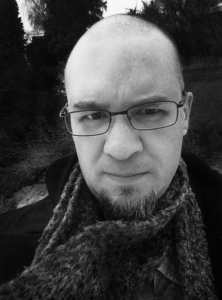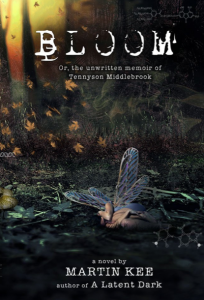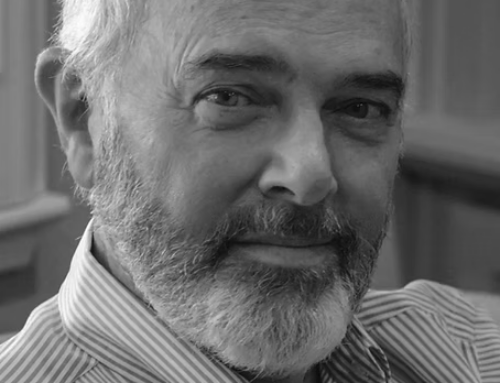
SPR Best Fiction Winner Martin Kee
SPR Awards Fiction Prize Winner Martin Kee talks about his winning book BLOOM
Tell us about your winning entry to the SPR Awards.
BLOOM is a book about two people living in two equally dangerous worlds. Tennyson’s world is overcome by plague, Lil’it’s world is a menagerie of mutations and draconian information laws. Both stories parallel each other in ways the characters survive and try to find some meaning in their worlds. For Tennyson, it’s finding his childhood friend before the world ends, for Lil’it it is about self-preservation. I tell people that it’s a sort of Grimm’s Fairy Tale meets The Andromeda Strain.
How did you come to self-publish? Did you try to get published traditionally?
I had sent BLOOM to a number of agents, and while I got some positive replies, none of them felt they could sell it. I had already author-published another novel with some success, so I was comfortable with the process.
What self-publishing service did you use? Happy with the service?
I use Amazon for both paperback (CreateSpace) and Kindle (KDP). Both sites are pretty straightforward without a lot of hassle. In some ways it’s almost too easy to publish by these means.
What avenues have you taken to market the book? Have you gotten reviews, interviews, TV, print media coverage?
I participate in everything I can get my grubby little hands on. Mostly these days, that involves group projects like the SteamPunk Extravaganza and StoryBundle. I also try and use social media, though I am admittedly something of an introvert, and just don’t have the stamina to tell jokes on Twitter ten hours a day. I also do interviews, because I am an author and authors love to talk about themselves and their books.
What drove you to write this particular book?
I wanted to say something about information, how it is integral to our lives on not just a media level, but on a biological one as well. I wanted to show the limits through which biology will go to survive and propagate. I also wanted to tell a sort of fairy tale about how information is controlled, and how misunderstanding and mishandling of the way we use information can have consequences. On the biological side of this you have bloom, which is a disease that craves the information in our cells, and on the other side you have Lil’it’s world where information is a non-reusable commodity. In both cases, information is at once the problem and the solution.
Is the book in any one particular genre? Is it a genre that’s familiar to you?
My work tends to exist in some fuzzy borderland between science fiction, fantasy and horror. I’ve categorized this book as bio-horror, but other people have told me it’s sci-fi. So I give up. I just try to write a story that’s interesting to me, and let the critics and readers put it in a box of their choosing.
Who are your greatest writing influences?
I grew up on Stephen King and Orson Scott Card. In college I read a lot of Crichton, Bear, and Brinn. Some of my earliest literary memories were reading The Hobbit, and The October Country. There’s something to be gleaned from every author, and some authors do some things better than others. Chuck Wendig taught me how to write better present tense through his work, and Larry Niven taught me how to present Big Ideas. King showed me how to write conversationally, and Gaiman showed me how to create mystery in fantasy.
What’s your writing regimen? Any tips for keeping focused?
When I am drafting a book, I aim for 2000 words a day, whether that’s 800 in the morning and 1200 at night. As long as I hit that goal I feel like I am making progress. I’m usually a morning person, so I am the one making the coffee at 8am and trying to work until life starts to take over. If I miss my goal, I try and make up for it that evening. If I’m stuck, I take walks, ride my bike, do chores. Sometimes staring at the blank page just sinks you deeper into a state of inaction. Usually I walk until I can come up with one good idea, then I head back and just start banging it out. In the end, the only real cure for writing related problems is more writing. Keep your butt in the chair. Eventually you find a groove one way or another.
Would you self-publish again?
Sure.
Any final words of advice for those looking to self-publish?
I cannot stress enough how important a good editor is. If you are going to present yourself to the world, you have to make sure your shirt is tucked in and your shoes are tied. When you publish your own work, that means fronting the costs for editors and cover art, just like the traditional houses. You treat it with the same seriousness as the Big Five. Otherwise you end up giving people one more reason not to give self-published authors a chance. I’d love to see the stigma of self-publishing fade into non-existence, but that won’t happen until all self-published authors treat it with the same level of professionalism. We have to be our own gatekeepers.
Martin Kee’s winning book, Bloom: Or, the unwritten memoir of Tennyson Middlebrook is available now in our bookstore and from most major retailers from our Bookshelf.
Get an Editorial Review | Get Amazon Sales & Reviews | Get Edited | Get Beta Readers | Enter the SPR Book Awards | Other Marketing Services






















Leave A Comment